“I think it’s really a surprise that the PTO – that is publishing the proposed rules – is now saying it’s not their proposed rules. If we got it wrong, we can revisit it, but it’s not up to the PTO to try and make the law and redo it in their rulemaking process.” – Rep. Zoe Lofgren
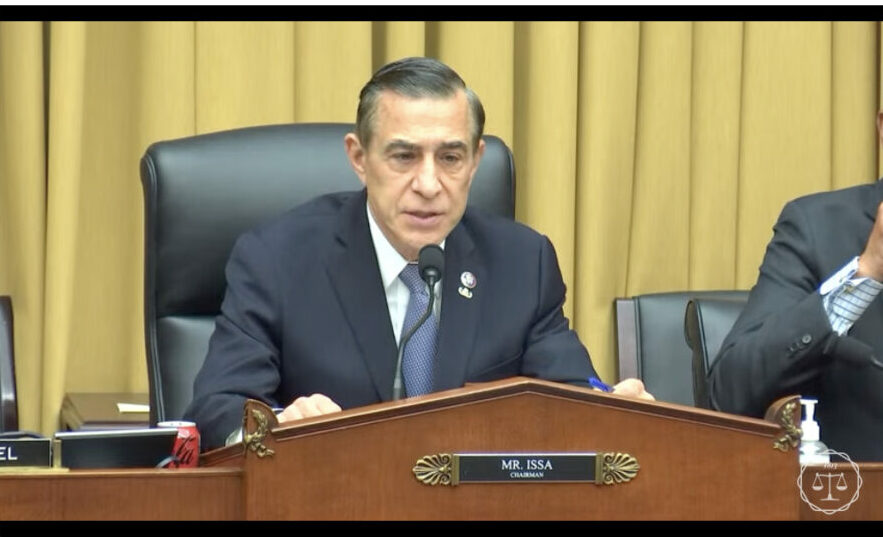 Today’s hearing of the House Judiciary Subcommittee on Courts, Intellectual Property and the Internet on Oversight of the U.S. Patent and Trademark Office (USPTO) demonstrated some confusion on the part of Congress about the intent of USPTO Director Kathi Vidal’s recent Advance Notice of Proposed Rulemaking (ANPRM) on changes to Patent Trial and Appeal Board (PTAB) processes, and suggested the Subcommittee members believe she may be exceeding her authority.
Today’s hearing of the House Judiciary Subcommittee on Courts, Intellectual Property and the Internet on Oversight of the U.S. Patent and Trademark Office (USPTO) demonstrated some confusion on the part of Congress about the intent of USPTO Director Kathi Vidal’s recent Advance Notice of Proposed Rulemaking (ANPRM) on changes to Patent Trial and Appeal Board (PTAB) processes, and suggested the Subcommittee members believe she may be exceeding her authority.
House IP Subcommittee: This is Our Job
Many of the Subcommittee members said they would prefer for the types of changes included in the ANPRM to go through the legislative body. Representative Nathaniel Moran (R-TX), for instance, said, “I’m seeing a lot of overstep I don’t quite care for,” and expressed concern about the separation of powers.
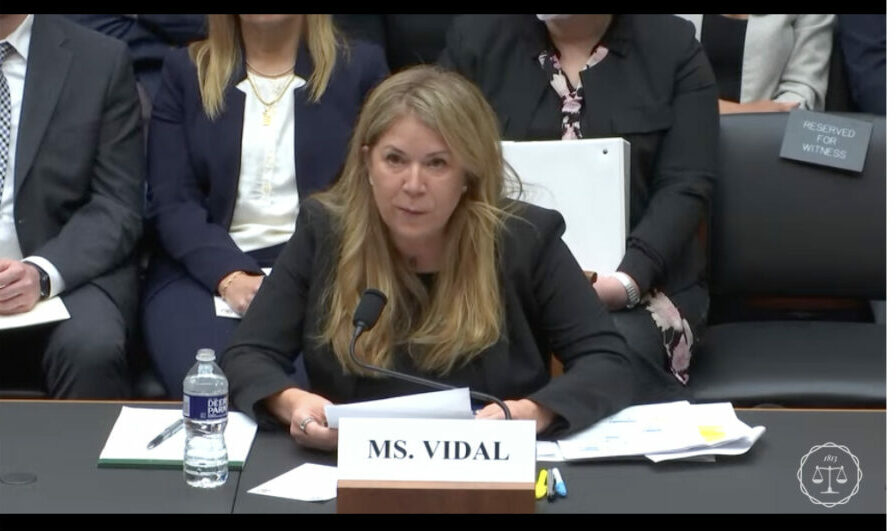 Vidal attempted to clarify that the ANPRM includes both stakeholder and USPTO proposals that they are looking for feedback on, and said some may not ultimately make it into the official Notice of Proposed Rulemaking (NPRM) set to be published later this year; however, the congress members seemed to dismiss this explanation and throughout the hearing likened the ANPRM proposals to an NPRM. “I still look at it as a proposed rulemaking,” Subcommittee Chairman Darrell Issa said toward the end of the hearing.
Vidal attempted to clarify that the ANPRM includes both stakeholder and USPTO proposals that they are looking for feedback on, and said some may not ultimately make it into the official Notice of Proposed Rulemaking (NPRM) set to be published later this year; however, the congress members seemed to dismiss this explanation and throughout the hearing likened the ANPRM proposals to an NPRM. “I still look at it as a proposed rulemaking,” Subcommittee Chairman Darrell Issa said toward the end of the hearing.
Congressman Russell Fry (R-SC) even asked Vidal if perhaps the ANPRM should be put on hold pending a thorough examination by the Subcommittee, but Vidal tried to assure Fry that the ANPRM is just an additional tool to collect stakeholder feedback, and not a proposed rulemaking.
Representative Zoe Lofgren (D-CA) shared Moran’s and Fry’s concerns, and said she found Vidal’s explanation for the inconsistencies in the ANPRM with congressional intent surprising, and “very odd.” Lofgren was particularly concerned with the proposed approach to creating an exception to discretionary denial if an inter partes review (IPR) petition is filed within six months in the ANPRM, rather than the statutorily-prescribed one year. Vidal again explained that the ANPRM contains provisions proposed by stakeholders and a “myriad of options,” and that the Office wants to hear feedback on whether they even have authority move forward with the proposals. But Lofgren was unconvinced.
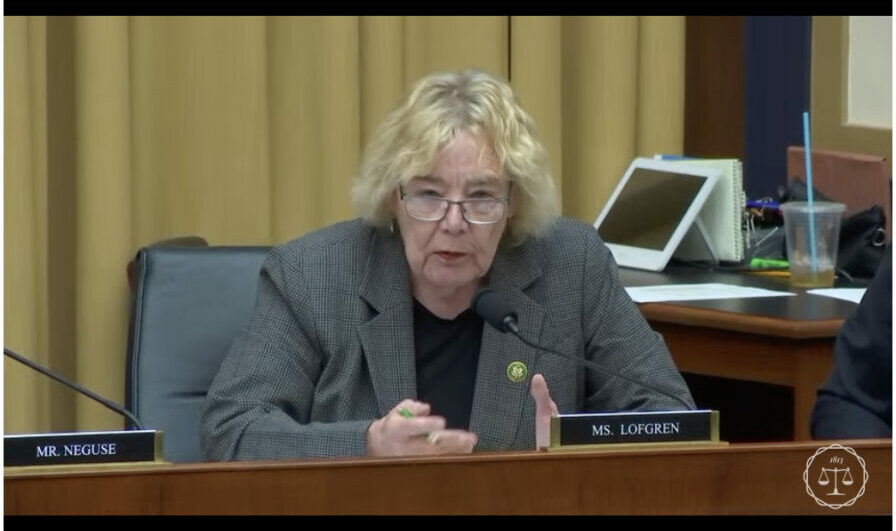 “It’s your proposed rule,” Lofgren said. Why would you propose something that’s inconsistent with the Act?” Vidal denied that anything was inconsistent with the statute and reiterated that it was her understanding the ANPRM is not the USPTO’s proposed rules, but rather a chance for stakeholders to shape the rules.
“It’s your proposed rule,” Lofgren said. Why would you propose something that’s inconsistent with the Act?” Vidal denied that anything was inconsistent with the statute and reiterated that it was her understanding the ANPRM is not the USPTO’s proposed rules, but rather a chance for stakeholders to shape the rules.
“I think it’s really a surprise that the PTO – that is publishing the proposed rules – is now saying it’s not their proposed rules,” Lofgren said. “If we got it wrong, we can revisit it, but it’s not up to the PTO to try and make the law and redo it in their rulemaking process.”
Representative Thomas Massie (R-KY) also actively questioned Vidal throughout the hearing, and shared his colleagues’ view that Congress should be shaping the law. He also called out the PTAB as catering to Big Tech and foreign entities.
Issa ultimately asked Vidal to provide names of everyone consulted in the process of compiling the ANPRM so the Subcommittee could get a better understanding of the Office’s “deliberative process.”
The Politics of Director Review
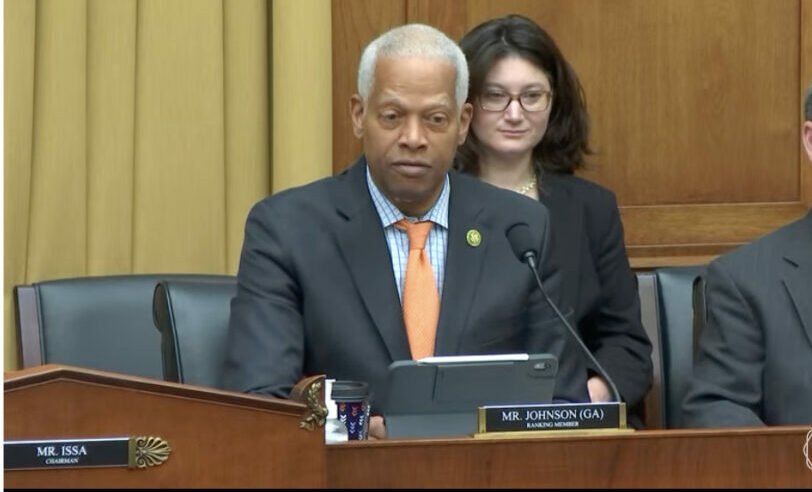 Many Subcommittee members also brought up the Director Review process post-Arthrex, which Vidal has been the first Senate-confirmed Director to implement. Subcommittee Ranking Member Hank Johnson (D-GA) asked Vidal how she ensures her decisions are free of political bias and said in his opening statement that Congress designed the PTAB’s decisions to be final and non-reviewable by the Director, and he is concerned about the degree to which the Supreme Court’s Arthrex decision “opened the PTAB up to political influence.” He added:
Many Subcommittee members also brought up the Director Review process post-Arthrex, which Vidal has been the first Senate-confirmed Director to implement. Subcommittee Ranking Member Hank Johnson (D-GA) asked Vidal how she ensures her decisions are free of political bias and said in his opening statement that Congress designed the PTAB’s decisions to be final and non-reviewable by the Director, and he is concerned about the degree to which the Supreme Court’s Arthrex decision “opened the PTAB up to political influence.” He added:
“The degree of change in PTAB proceedings under different Directors has done nothing to allay my fears. The patent system is not meant to be subject to frequent and unpredictable fluctuations. The point of a 20-year patent is to allow for planning, investment and realization of new inventions. I’m concerned we’ve allowed the law to become too subjective and too subject to the particular views of different administrations. This is not the stable basis on which our country’s innovation ecosystem should rest.”
Johnson was also concerned about the problem of fraudulent trademark filings, which the processes implemented by the Trademark Modernization Act of 2020 helped to curb to some extent, but filers have learned how to abuse as well. Vidal agreed, but said that between December 2022 and March 2023, 19 U.S. licensed attorneys were referred to the Office of Enrollment and Discipline for investigation related to signing fraudulent trademark applications. “We’re aware and on top of it,” she said.
Issa: Why Not Go Directly to Rulemaking?
Discretionary denial practice was perhaps the topic raised most frequently during the hearing, and Vidal said it is also the biggest concern she has heard from litigants in the PTAB process during her first term “year of listening.” That is why she issued the interim guidance on discretionary denial and now the ANPRM. But Issa questioned whether this approach is even proper. He asked Vidal:
“Many of the things in your ‘proposed proposed rulemaking’ include items which have become part of an unofficial operating procedure at the PTO. In other words, you’ve been doing them as though they were rules for a period of time, and now they’re out there as comment. Do you think it’s appropriate to put them out for further comment when in fact you’re already doing them, or should they have gone directly to rulemaking, since you’re already doing them without going through the statutory process that we on this side of the dais have legislated for you?”
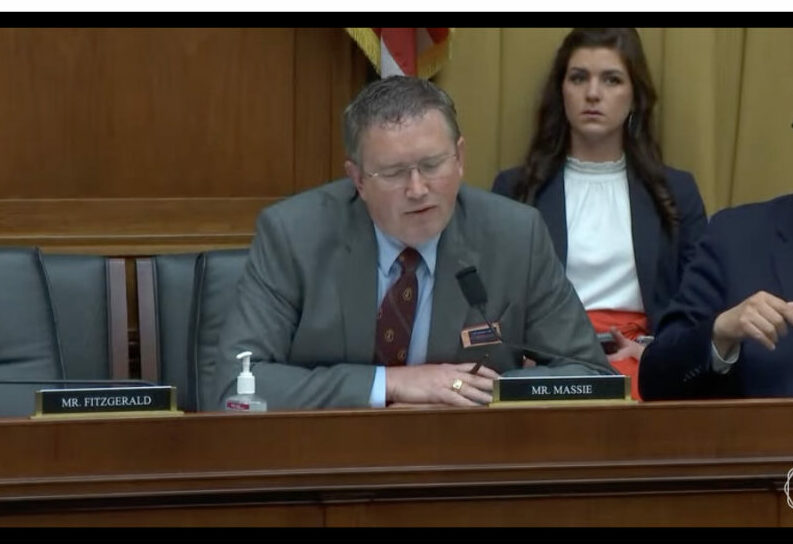 Vidal replied that putting out guidance and precedential decisions first provides more clarity for the 230 PTAB judges, who exercise her discretion by delegation. While she always considers her guidance interim, she said she would not otherwise have the ability to ensure they were exercising her discretion in the way she would exercise it. “I believe wholeheartedly in notice and comment rulemaking, and even with the guidance, it’s just meant to memorialize current practices,” not to engage in policymaking, she added.
Vidal replied that putting out guidance and precedential decisions first provides more clarity for the 230 PTAB judges, who exercise her discretion by delegation. While she always considers her guidance interim, she said she would not otherwise have the ability to ensure they were exercising her discretion in the way she would exercise it. “I believe wholeheartedly in notice and comment rulemaking, and even with the guidance, it’s just meant to memorialize current practices,” not to engage in policymaking, she added.
The Subcommittee members also raised questions about the need to fix patent eligibility law in order to remain competitive with China; the issues surrounding forum shopping and trial times in the Eastern and Western Districts of Texas courts; whether standing should be required to bring PTAB cases; and the due process problems raised by Federal Circuit Rule 36 decisions for small businesses and inventors. On the latter topic, Massie introduced for the record IPWatchdog’s January 2019 article.
While the hearing did not touch substantively on Vidal’s Request for Comments on Robust and Reliable Patents, which include a number of provisions that would impact patenting practices in the life science space, in written testimony submitted to the Subcommittee, the U.S. Chamber of Commerce’s Global Innovation Policy Center (GIPC) said today that it supports USPTO efforts on inclusive innovation but that it is concerned about “contemplated actions on the life-sciences innovation ecosystem.” The GIPC also said it is “concerned about the breadth and complexity of the USPTO’s recent advance notice of proposed rulemaking on the post–grant review process, even as we continue to review the issues raised.”
Vidal’s full testimony is available here.

![[IPWatchdog Logo]](https://ipwatchdog.com/wp-content/themes/IPWatchdog%20-%202023/assets/images/temp/logo-small@2x.png)

![[Advertisement]](https://ipwatchdog.com/wp-content/uploads/2024/04/Patent-Litigation-Masters-2024-sidebar-early-bird-ends-Apr-21-last-chance-700x500-1.jpg)

![[Advertisement]](https://ipwatchdog.com/wp-content/uploads/2021/12/WEBINAR-336-x-280-px.png)
![[Advertisement]](https://ipwatchdog.com/wp-content/uploads/2021/12/2021-Patent-Practice-on-Demand-recorded-Feb-2021-336-x-280.jpg)
![[Advertisement]](https://ipwatchdog.com/wp-content/uploads/2021/12/Ad-4-The-Invent-Patent-System™.png)







Join the Discussion
8 comments so far.
HedgeAppleJoe
April 30, 2023 05:52 amBig Tech companies are using the PTAB as their Pirate ship. Google and Samsung have used Tag Team tactics to try and avoid “Time Bar” on multiple occasions and been very successful using this tactic which makes any honest person question the obviously rigged sytem. The idea that Google and Samsung and others are not “RPI’s(Real Parties in Interest) and Privies” is laughable. They are connected at the hip. It is Nonsense.
On the Waco and Eastern District of Texas Trial Times subject, any legislator complaining about the “Speed and Efficiency” that these District judges get the cases to Trial is probably in the pocket of Big Tech. Watch any politician closely who criticizes the idea that “Justice Delayed is Justice Denied”.
The PTAB should be disbanded. It is corrupt. The idea that Judges are comped on how many reviews they “institute” and the fact that cross examination and discovery is limited should be unconstitutional.
Anon
April 28, 2023 09:10 amDear Congress: you should not have given unfettered discretion to institute or not to the administrative agency.
ghostndragon
April 28, 2023 08:58 amWhy the sudden concern by Congress now? The USPTO has been engaged in overreach and ignoring them law on rulemaking for at least a decade. Heck, restriction practice exists because of USPTO rules, not law. And has anyone considered that it’s the job of examination to make sure that patents are high quality? Not PTAB or public opinion? Also, Issa can’t help but be a smarmy douche even when he’s got a good point. Oh, and while we’re talking about overreach, let’s get in with paying our bills instead of taking the country hostage for political purposes.
James T.R.
April 28, 2023 03:52 amThe main and ultimate problem is the PTAB themselves. They have fmdone nothing cater to large corporations and big to to have legitimate patents invalidated so that wealthy infringers can jyst steal independent inventors inventions without paying the inventor for his or her IP.
mike
April 27, 2023 08:55 pm+1 on Pro Say’s comment. Reproduced below.
Oh, that the subcommittee cared as much about SCOTUS’ unconstitutional usurpation of their right to determine what is and what is not patentable as they (rightfully) are about what the PTO is considering doing.
Separation of powers is separation of powers is separation of powers.
Is it not?
Julie Burke
April 27, 2023 04:58 pmICYMI
https://ipwatchdog.com/2023/03/14/recent-mpep-changes-complicate-sticky-wicket-restriction-thickets/id=157729/
and
https://ipwatchdog.com/2023/03/23/uspto-flexes-aia-powers-make-retroactive-substantive-mpep-policy-changes/id=158222/
Julie Burke
April 27, 2023 04:48 pmI commend the House Judiciary Committee on Courts, Intellectual Property and the Internet for their investigation into the USPTO’s pervasive culture of administrative overreach.
This overreach squarely extends to the USPTO’s MPEP revisions made during the Request for Comments on Robust and Reliable Patents.
To paraphrase Subcommittee Chairman Issa:
Many of the things in the USPTO’s Request for Comments on Robust and Reliable Patents” include items such as changing the serious burden criteria for restriction practice, which have since RETROACTIVELY become part of the OFFICIAL operating procedure at the USPTO.
In other words, the USPTO had already secretly altered restriction practice procedures as though they were rules effective July 2022, then they’re out there as comment from Oct 2022 to Feb 28, 2023.
On March 3, 2023, three days after the comment period ended, the USPTO published the MPEP with a revised Chapter 800 that retroactively expanded restriction practice in a manner which will create the opportunity for more restriction patent thickets.
These actual actions were undertaken while the Executive Branch and Congress was directing the USPTO to reign in (not expand!) patent thickets and while Director Vidal was channeling Frasier “I’m listening” Crane.
While Director Vidal is listening to the IP Community comments, the Executive Branch, Congress, the IP Community and the American public are indeed watching the USPTO’s actions.
Pro Say
April 27, 2023 02:41 pmOh, that the subcommittee cared as much about SCOTUS’ unconstitutional usurpation of their right to determine what is and what is not patentable as they (rightfully) are about what the PTO is considering doing.
Separation of powers is separation of powers is separation of powers.
Is it not?